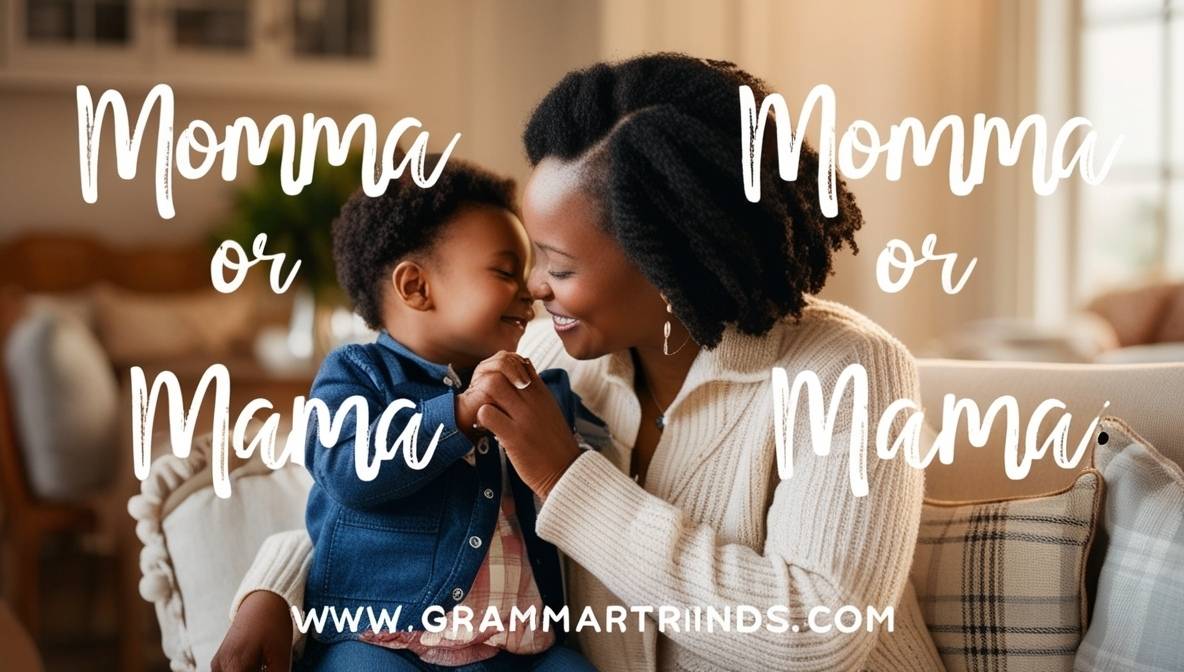When it comes to Momma or Mama, many people get confused about which term to use and why. The difference between momma and mama might seem small, but it carries a lot of weight in terms of cultural significance momma or mama and the emotional connection momma or mama creates. These words are not just simple nicknames they reflect regional dialects, family traditions, and even childhood language development.
Understanding these informal terms for mother helps you appreciate the rich language identity and heritage behind them. Whether you grew up hearing “momma” in the Southern U.S. or “mama” in bilingual homes, both carry unique meanings worth exploring.
What Does Momma Mean
Momma is an affectionate, informal term for mother widely used in the Southern United States. It brings to mind warmth, comfort, and deep family bonds. Think of cozy Sunday dinners or stories passed down from generation to generation “momma” fits right in.
For example, a child might say, “Momma, can you fix my bike?” Here, the word feels nurturing and familiar, almost like a gentle hug in sound. Tip: If you want to express a homey, heartfelt connection, “momma” often nails that feeling.
What Does Mama Mean
On the other hand, mama is a universal maternal term that babies all over the world learn early. It’s simple, easy to say, and crosses cultures and languages—like Mamá in Spanish or Mamma in Italian.
Imagine a toddler calling out, “Mama!” Whether in New York or Nairobi, it conveys pure affection. This word feels soft and straightforward. Tip: When aiming for a more global or tender tone, “mama” is your go-to choice.
Pronunciation and Regional Differences
The difference isn’t just spelling. The momma vs mama pronunciation varies by region. In the American South, “momma” sounds like MOM-uh, stretched and warm. Meanwhile, “mama” is often pronounced MAH-muh, quick and light, heard everywhere from homes to lullabies.
Picture hearing:
- “Momma’s cooking is the best,” (Southern charm)
- Versus “Mama loves you,” (simple and universal)
Tip: Let the accent and mood guide your choice.
Emotional Connection Momma or Mama
The emotional connection momma or mama builds can be different too. “Momma” often carries nostalgia, a strong link to family heritage and tradition. “Mama,” however, feels more gentle and tender, a universal expression of love.
For example, a heartfelt song might say, “Momma, don’t you cry,” evoking deep roots and history. Meanwhile, a lullaby singing “Mama loves you” brings soothing calmness. Tip: Pick the word that matches the emotion you want to convey.
Cultural Significance Momma or Mama
The cultural significance momma or mama shows why these words mean more than just “mother.” “Momma” often ties to African American culture and Southern U.S. traditions, symbolizing respect and heritage. “Mama” shines globally used in many bilingual homes and language usage, especially in Latino and European families.
For instance, “momma” might resonate in a Southern story, while “mama” connects instantly with Spanish-speaking families around the world. Tip: Always consider cultural background when choosing your words.
Momma vs Mama Usage in Sentences
Here’s a quick glance at how you might use each word naturally:
| Situation | Momma Usage | Mama Usage |
|---|---|---|
| Asking for help | “Momma, can you fix my bike?” | “Mama, can you fix my bike?” |
| Expressing love | “I love you, Momma.” | “I love you, Mama.” |
| Sharing stories or memories | “Back in Momma’s day…” | “Mama always said…” |
| Talking to a child | “Momma’s here now.” | “Mama’s here now.” |
Tip: Match your word to your audience and emotional tone for best effect.
Synonyms for Momma and Mama
Sometimes, you might want a fresh way to say mother. Here are some popular mother synonyms:
- Mom – common and versatile
- Mommy – sweet and childlike
- Ma – very informal and regional
- Mum – mainly British English
Choosing the right synonym depends on tone, culture, and formality.
FAQs About Momma or Mama
Is it momma or mama more popular in American English?
“Momma” is more common in Southern U.S. dialects, while “mama” is widespread and universal.
Can I use momma and mama interchangeably?
Mostly yes, but cultural and emotional context matters.
What emotional difference exists between momma and mama?
“Momma” often feels nostalgic and regional; “mama” sounds tender and universal.
Final Words
Choosing between Momma or Mama comes down to the feeling you want to share. Both words mean mother but carry different tones and cultural meanings. Knowing the difference between momma and mama helps you speak more clearly and connect better with others. Whether you say “momma” with a warm, Southern touch or “mama” with a simple, universal feel, both show love and care. So next time you wonder which to use, trust your heart and the story you want to tell. Momma or mama either way, it’s all about family.
